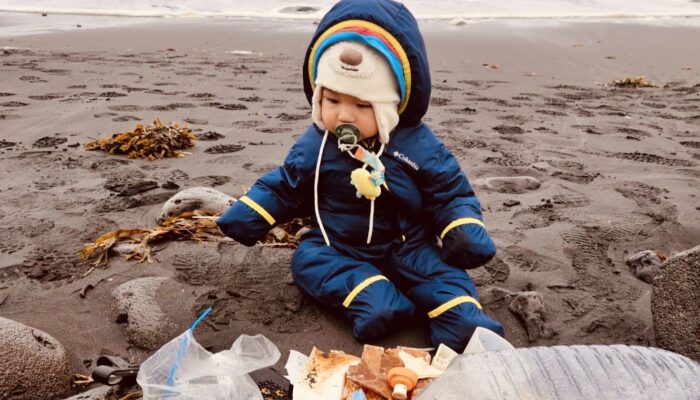
We are researchers. Researchers are people. People sometimes have children.
These are three simple statements (and fundamental truths) that are often overlooked by institutional and funding policies, leading to a disconnect between the demands of research and the responsibilities of parenthood. Especially in field-based research, which is typical in the geosciences, rigorous expectations of long hours and extensive travel (not to mention the fieldwork prep and the constant pursuit of funding) can make it challenging for parents to juggle professional aspirations with familial obligations. Insufficient institutional support affects the well-being of researchers and hinders the retention of diverse scholars (and thus, advancements) in academic and research environments.
Parenting in and out of the field
Our exploration of parenting and fieldwork was inspired by our own experiences; one of us ventured into the field with her baby in tow, while the other occasionally took on the role of impromptu nanny. If you Google “parenting in the field”, you will see that lots of people do it! (For example, see this article and this one). There are numerous published accounts in peer-reviewed journals, particularly within ethnographic research fields, detailing the experiences of parent-researchers who have brought their families into the field (otherwise known as accompanied research). Anthropologist Anna Madeleine Ayeh does a great job of detailing the “her*story” (herstory = feminist retelling of history) of children in the field in her article Doing Fieldwork While Parenting: Between Challenging and Intensifying Structural Power Imbalances in Anthropological Knowledge Production. There are even a handful of books on the matter, such as Mothering from the Field: The Impact of Motherhood on Site-Based Research, which collects perspectives from women scientists who conduct fieldwork across multiple disciplines. Their chapter subtitles, such as “The Truth Is, It Will Be Hard”, “Teamwork Makes the Dream Work”, and “Because Mothers Can Do Anything!” are probably familiar mantras uttered by women (and/or to women) conducting field research while raising children.
Representation matters. Reading about the struggles and triumphs of parent-researchers (especially mothers) is inspiring because it shows that it is possible to be a parent without giving up a field-based career. These stories not only provide strategies and coping mechanisms to the reader, they offer a sense of belonging and a reminder that they are also capable of overcoming similar obstacles and challenges. That being said, there are rarely any published insights from parent-researchers who do unaccompanied research (Jenkins, 2020). Because, why would there be? This is simply the essence of everyday life, as this article opens by stating: people sometimes have children. However, this reality has its own challenges, such as having to shorten field trips to avoid being away from family for too long, and thus resulting in stressful, intensified research crammed into a short timeframe (Jenkins, 2020). Balancing the demands of parenthood with the rigours of fieldwork, whether with or without family, can take a significant emotional and physical toll, and could be the reason why one chooses to step away from a research career.
Institutional policies and support
Fieldwork is inherently challenging, combining complex logistical puzzles, physical demands, unpredictability, and interpersonal dynamics – often in remote and harsh environments. When parenting duties are factored in, whether in the field or from afar, the juggling act becomes even more complex. No amount of support could fully alleviate the hardships of fieldwork, parenting, and the unique difficulties that arise from juggling both. But what if best practice policies and programs existed that other — or your — institutions could learn from? What if there was funding that could remove financial barriers for parents who want/need to do accompanied research? What forms of support significantly impact a woman’s decision to remain in research, rather than drip out of the leaky pipeline?
These are the kinds of questions we aim to explore and understand in relation to parenting and fieldwork. To do this, we created a survey to gather insights on the challenges and strategies employed by parents in the field (both apart from children and during accompanied fieldwork), with the ultimate goal of enhancing support systems and resources for those navigating similar paths. The survey is open to researchers across all disciplines and genders who have conducted fieldwork while in a parental role, either currently or in the past. We consider fieldwork broadly as any research or data collection outside of the context of one’s regular office, laboratory, or classroom setting.
One of our aspirations is to mitigate the significant disparities between countries in their policies regarding support for parents engaged in fieldwork. For instance, in Germany, where one of the co-authors of this article is employed, numerous research institutes and universities provide a modest subsidy for childcare during fieldwork, which also partially covers travel and accommodation expenses for the child and accompanying caregiver. In contrast, while logistical and financial support for childcare at larger professional conferences in the United States is on the rise, there remains a notable deficiency in assistance for caregiving responsibilities during fieldwork (Jones, n.d.). To address this issue, one academic mother at the University of Alaska Fairbanks, Melissa Ward Jones, who chairs the U.S. Permafrost Association Diversity, Equity, and Inclusion Committee, highlighted the challenges of caregiving and remote fieldwork and took the initiative to establish a fund aimed at supporting early-career caregivers within the field of permafrost science by covering childcare costs incurred during fieldwork (Jones, n.d.).
Gender disparity
This article wouldn’t be complete without addressing the mother elephant in the room! Our survey seeks to gather experiences from parents of all genders, however, there is evidence that women scientists are in a more precarious position when it comes to choosing between parenting and their careers. Almost half of women scientists in the US leave a full-time STEM career after the birth of their first child (Else, 2019). The motherhood penalty, maternal wall bias, and maybe-baby effect are barriers to women’s career developments that stem from societal and cultural attitudes towards working mothers. You or someone you know may have shared “horror stories” about women’s experiences during academic hiring processes, for example: “…over dinner following a job talk, a senior male faculty member casually asked the woman applicant what her ‘breeding plans’ were.” (Delacruz & Speer, 2023).
In the context of fieldwork, biological necessities can add complications for mothers compared to their male counterparts. For example, breastfeeding can either limit a mother’s ability to travel for field research or necessitate bringing her baby with her to the field (as was the case for this researcher, and for one of the authors of this article).
With that said, similar experiences of accompanied research by fathers/non-mothers is rare (See: Starrs et al., 2001 and Martin-Shields, 2024). This may be due to gender norms of a by-gone era, when women would have been available to “tag along” with their researcher spouses to provide childcare. Even in a recent study by Lynn et al. (2018) of field-based anthropologists, the authors found that men tended to rely exclusively on a co-parent for childcare while in the field. However, as societal norms evolve and parenting and professional roles become more equitable, it is crucial to recognize the unique challenges faced by fathers — a perspective that is often overlooked. This is an oversight that our survey hopes to correct by including persons of all genders.
Supporting parents who conduct fieldwork supports the future of research itself — it takes the long view. By improving institutional and funding policies to address the unique challenges faced by parents who conduct field-based research, we can retain brilliant minds who may otherwise pursue careers elsewhere. By helping women and parents thrive in their careers, we not only enrich our research communities and drive innovation, but also ensure that the next generation of scientists can continue to explore, discover, and inspire.
Know someone who’s balanced fieldwork and parenting? Pass the survey along! If you’ve done fieldwork as a parent, your insights can help drive better institutional support. Share your experience here!
We’re excited to share that we’ll be at EGU25! We’ve planned a warm and welcoming Townhall Meeting (TM8) “Mothers in the Field: Sharing Experiences, Coping Mechanisms, and a Call to Action.” If you are attending the EGU this year, please join us on Wednesday, April 30th, from 19:00 to 20:00 (CEST) in Room 0.49/50. We would love for you to come and connect with fellow attendees who share your interests and insights. Your voice matters, and we can’t wait to hear your experiences!




